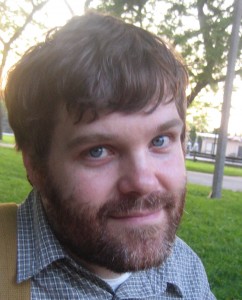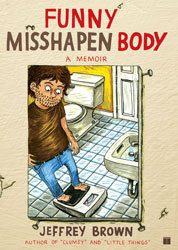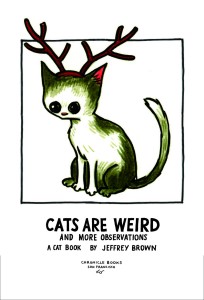Work of Art: Interview With Comic Artist Jeffrey Brown
September 15, 2010
As a working artist, Jeffrey Brown seems to be living the dream: He’s paid to do what he loves. Brown writes and draws comic books as well as teaches a class on comics. He’s been published by Marvel, Top Shelf, Chronicle Books and Simon & Schuster, and he’s settled down with a wife and child following a string of failed relationships that served as plotlines in several of his graphic novels. But Brown paid his dues along the way. His artistic path took a detour while he studied for a Master of Fine Arts at the School of the Art Institute of Chicago – he realized that a career in painting wasn’t for him and switched to his childhood passion, comics, while supporting himself by working at a bookstore. This week Brown took some time out from his latest full-time gig – being a dad – to chat with me about the realities of art school, health insurance and managing finances; as well as his process for creating comic books. In “Funny Misshapen Body,” you describe your disillusionment with art school. Do you have any advice for budding artists who want to take the next step in their education? It’s funny because I’m actually now teaching there, at the School of the Art Institute. I took over a comics class for a teacher. As much as I was disillusioned, art school still ended up pushing me where I needed to go, just not in the way I expected. My advice is to make as much work as you can and get feedback from as many places as you can. It might not be what you want, but years down the road it might make sense. As much as I felt art school showed me what I didn’t want to do, I wouldn’t have realized if I hadn’t gone. I didn’t realize I didn’t want to be a gallery artist until I was trying to make a go of it. It’s almost like you can use school and what you’re being taught to find the direction to follow or push against. The end result is the same in that you push your art in a new direction and express what you want to express. I found art school to be very useful in that way. Describe your period between art school and publishing your first comics – how did you support yourself? I worked full time as a music manager at Barnes & Noble. I worked part way through my first year of grad school to six years after getting my MFA. It was a long time before the day job went away – partially because by working for Barnes & Noble I could get health insurance, and when you’re a self-employed artist, getting insurance is one of the most difficult things. Also, just working in a bookstore was stimulating for a long time by seeing what books other people were putting out. It’s one of the things I miss most sometimes, though these days I enjoy going into a bookstore. Where do you find inspiration? I keep a sketchbook that I rely on for stream-of-conscious ideas. Especially early on in my career, my ideas were drawn through keeping those sketchbooks – observing the world, drawing things I see, reading newspaper articles and coming up with a joke on the spot. I also look at old sketchbooks and see a new point of view from old ideas. Now I’ve accumulated lists of ideas I’d like to do in the future. Over time I’ve become slower and more methodical in the way I work, so projects take a bit longer. Real-life demands of having a kid have slowed things down. I keep a list of ideas for projects and let them turn over while I work on other things. After a while I’ll take something off the list because I’m not interested, when it comes down to it. Ultimately, it all comes down to observations of life, whether it’s autobiographical or fiction. My comic book parody “Bighead” is based on real life. The Beefy Hipster makes fun of myself – going to shows in Chicago and buying shirts and coming home and finding they’re too tight. Falling in that trap of mentioning I know someone in the band – it’s all real-life stuff, making fun of me. Ultimately, my fiction draws on my own life and what I see. What comes first with your comics – the drawing or writing? The writing. I have a pretty complete script with any book that’s at least written out on a page-by-page level. Sometimes, especially with my cat comics, those are a little less writing-centric – those come out more visually. I usually have a pretty detailed plan for the overall structure of any book. The fictional, fun comics tend to be a little looser, but autobiographical stuff has panel-by-panel scripts. The script will change as I start drawing, though. A lot of your books range from autobiographical in nature to complete memoirs. Do you ever second-guess your need to bare all? No. I think I’m pretty comfortable with everything I’ve put out there, though I am much more careful about what I write now. Going forward, I might slightly alter how I write. But I don’t have any regrets about how I’ve written before. I try to be fair. If you read the books, there’s a sense, hopefully, that it’s less about specific people and more about feelings and aspects that I’m trying to write about. A lot of your comics have dealt with failed relationships. Now that you’re married and a father, do you think your themes will drastically change? Yeah, I think that I started drifting away from writing about the failing relationships when I was still having them, and it’s less interesting to write about successful relationships. Parenthood is something I’m more interested in. The one autobiography I haven’t written deals with religion and fatherhood, with my dad being a minister and my relationship with that as well as my own son. It seems like it might be a more mature theme, more adult theme, in a way. The idea of writing about having a kid, I guess, is inherently more grown-up. You have your hands in quite a few projects. Do you manage the business side, such as marketing and finances, as well? Yeah, I have a literary agent who handles the biggest projects, and he’s there in terms of advice. Top Shelf is a bit of a family situation; I can call them for advice, too. As far as marketing, I’ve been fortunate with word of mouth, especially early on in my career. Mostly, I handle it all myself: my e-mails, my books. The downside is I’m not very organized – I don’t keep a mailing list, when it comes down to it. But it works out OK if people keep up on their end. I’ve adopted the “inbox zero” philosophy of dealing with e-mail right away if possible. I don’t know if it’s practical business sensibility or OCD. When you have a regular job, you have a regular source of income – you know how much it’s going to be. One of the hardest things about being a full-time artist I still struggle with is managing money and figuring when it’s coming in. Do I invoice? Will I get paid right when a project is finished? The irregularity of the income is disorienting. You have to rein yourself in after you finish a large job, and you have to set aside for money and bills. How’s teaching? Mixed feelings. I think I’m maybe not a natural teacher. I don’t know if that’s because I don’t have any experience and feel awkward about it. But the students I have are really great, and most of them have been way more open to listening to me than I was to my own teachers. I’ve done two classes so far, and I think they went fairly well. Going in I knew it’d be a one-time thing and not something I’d pursue professionally, though I’d be open to teaching a class I constructed myself. I think it’s gone OK. I’m just trying to give the students something from my own experiences that I couldn’t get from someone else teaching comics. What’s next with your career? I heard you’re doing something for Marvel’s “Strange Tales,” vol. 2, which seems like a departure from your usual work. In a way it is, but in a way it goes back to my childhood dream of writing for Marvel. I did a two-page story for the first volume and have a four-page for the upcoming, second volume. “Strange Tales” is still more humor-oriented – it’s not quite a parody like “Bighead,” but it’s not a straightforward superhero comic. I have a lot of fun with it. Sometimes I think I’d like to do a straightforward superhero story, but we’ll see what happens. I have a few ideas, but it remains to be seen if I’ll follow through with them or my heart’s not into it after all.













Great interview.
Agreed, it was a great interview.
Love it! And love you, Jeff! :)